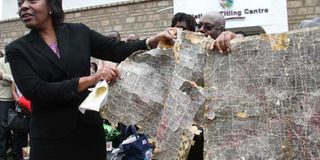The government needs some major technology achievements in 2015

Lands Cabinet Secretary Charity Ngilu addresses reporters at the National Titling Centre, Survey of Kenya, on August 28, 2014 while holding a tattered map after she launched a campaign to correct errors in land records and come up with clean maps. PHOTO | JENNIFER MUIRURI | NATION
What you need to know:
- If we managed to pass the Security Laws (Amendment) Act 2014 in a record one week, it should be equally possible to use the infamous tyranny of numbers to push through these useful laws.
- The NSDI would provide the backbone for digitising our lands records to a point where we could complete land transactions online fully.
- The Lands Information System has been under development for the last fifteen years and it is highly unlikely that 2015 will be the year it gets completed.
It would be nice to come up with an ICT wish list for the year before the month moves beyond the point of making New Year resolutions. To enhance the probability of success, we can map our wish list onto some of the projects outlined in the ICT Master plan (2013-2017).
The ICT Master Plan includes key flagship projects that aim to transform Kenya into a digital society. The projects are listed under several themes, including Law, eGovernment, Infrastructure, Workforce, Enterprises and Automation.
Under the theme of Law, the government hopes to pass legislation including the Data Protection Act, the Access to Information Act and the Cybercrime Act.
The Data Protection Act would ensure that digital information regularly collected by telecommunications providers, banks, hospitals and government agencies, among others, is given the security, privacy and confidentiality it deserves.
The Access to Information Act would provide a mechanism for citizens to demand and obtain government-related data if and when they request it, in line with the new constitutional requirement for transparency and accountability. It would demystify the highly abused Official Secrets Act that is used by government agencies to sit on information, however public that information may be.
The Cybercrime Act would provide a legislative framework that would enable the police, prosecutors, the judiciary and the communications regulator to work together in order to provide a multipronged approach against emerging threats in cyberspace.
Our wish list anticipates having all this legislation in place by the end of the year. If we managed to pass the Security Laws (Amendment) Act 2014 in a record one week, it should be equally possible to use the infamous tyranny of numbers to push through these useful laws.
Under the eGovernment theme, there are several projects listed, but two of them should make it to our wish list. The first one is the National Spatial Data Infrastructure (NSDI), and the second is the National Persons Data Hub (NPDH).
MAPPING EPIDEMICS
The NSDI would provide the backbone for digitising our lands records to a point where we could complete land transactions online fully. Furthermore, the same infrastructure could be used to provide residence-based addresses for Kenyans, something that could boost e-commerce-based initiatives.
The health and emergency response sectors could also use the same platform to map existing resources such as hospitals, police posts and fire stations against any evolving emergency events.
For example, mapping data of an epidemic over a geographic location gives health managers a better view of how to contain it, while managing a fire outbreak with clear spatial data could inform emergency crews in advance that access to the location would not be possible for fire engines.
The NPDH would provide a central backbone for digitising a person's birth registration, national identity card, passport, vehicle log book, driving license, and tax and electoral records, among others, essentially creating one unique identifier or ID per citizen, rather than several identifiers talking about the same citizen.
From a citizen point view, you would have one plastic card that is machine-readable by the police for your driving license, by the IEBC for voting and by the Kenya Revenue Authority for your tax returns, among others.
CANNIBALISATION LIKELY
Our wish list for 2015 must surely include these projects, but experience tells us that this may not be the year to see them happen. The opposition politicians are, for example, very suspicious of the National Persons Data Hub, with many imagining that it is an advanced form of rigging the next elections. They are therefore likely to try to sabotage or frustrate the implementation of the whole project.
On the other hand, the National Spatial Data Infrastructure has the Lands Information System as the main component. The Lands Information System has been under development for the past 15 years and it is highly unlikely that 2015 will be the year it gets completed.
With our leadership owning most of the land assets in the country, the digitisation of the Lands records is likely to be cannibalised from within government and tacitly supported by the opposition.
It is clear that none of our business leaders and politicians are keen on implementing a system that can, at the touch of a button, tell us who owns the controversial land in Karen, Lamu and Mau Forest, among other areas.
Under the Infrastructure theme, the laptop project, which would integrate ICT in schools, the affordability of broadband Internet, and the Health Information systems are all important in terms of transforming our society into a knowledge economy.
These should also make it onto our 2015 wish list, and we shall review them next week as we conclude the second part of the self-declared government resolutions for ICT.
Mr Walubengo is a lecturer at the Multimedia University of Kenya, Faculty of Computing and IT. Twitter:@jwalu Email: [email protected]





